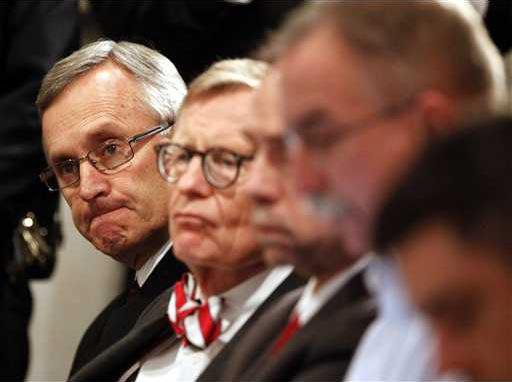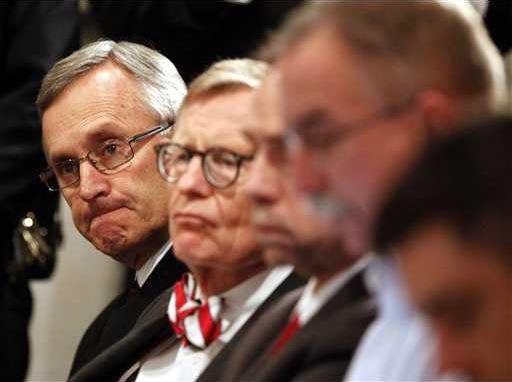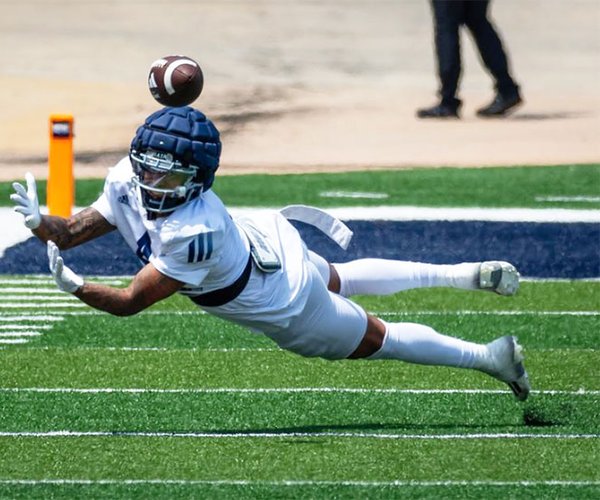For all the justifiable criticism of those who run big-time college athletics, you've got to give 'em this: They don't make much of an effort to hide the hypocrisy.
The bowl system is convoluted and unfair? Sure, but the major conferences couldn't care less since they're the ones benefiting at the expense of the little guys.
The student part of student-athlete is nothing but a ruse? Of course, but English 101 is irrelevant as long as they can dunk a basketball or throw a football like a laser.
And now, our latest offering from a septic tank of a system that's unlikely to be flushed out in our lifetime.
Ohio State coach Jim Tressel was suspended for two games Tuesday after it was learned he had been tipped off nearly a year ago about a federal investigation into questionable activities involving some of his players, including a memorabilia-for-tattoos arrangement with a very seedy parlor owner.
Problem is, Tressel didn't bother telling anyone about it, even though that very requirement is underlined in his contract. He'll also get a $250,000 fine, a public reprimand (whatever that means on top of a suspension and fine) and have to make a public apology, no doubt ghostwritten by some combination of lawyers and public-relations folks.
"I plan to grow from this. I'm sincerely saddened by the fact that I let some people down and didn't do things as well as I possibly could have," Tressel said, tears welling in his eyes.
Cry me a river.
This is nothing more than a slap on the wrist.
Why did the school decide to sit Tressel for only two games, while the players involved in the illicit behavior, including star quarterback Terrelle Pryor, received a five-game ban from the NCAA? Why does the Ohio State coach serve a lighter sentence than former Georgia receiver A.J. Green, who got a four-game ban in a totally unrelated and seemingly more minor case — selling a bowl jersey to put a little cash in his pocket?
Because this is college athletics, where doing what's right is usually way down on that honey-do list, certainly far behind whatever it takes to keep the money rolling in to those school coffers. (Which, of course, is why the players must remain pure amateurs, or at least work out their own side deals without getting caught.)
The Ohio State players got caught bartering football memorabilia for money and tattoos. Their coach knew about it. Yet, the thing that surely took precedence over all that ugliness was Tressel's record on the field: 106-22 in a decade of coaching the Buckeyes, including a national championship back in 2002.
There was absolutely NO chance that Ohio State might actually do the very thing it had a right to do under Tressel's contract: Fire him for failing to report any information related to violations of NCAA, Big Ten or Ohio State bylaws and rules. Heck, according to athletic director Gene Smith, that step wasn't even seriously considered.
Why?
Have you not been listening? Remember, this is college athletics, where the overriding consideration is nearly always the bottom line. Tressel's program has made tens of millions of dollars for Ohio State. Might as well ride that gravy train a little longer, especially if it means beating Michigan every year and contending for Big Ten championships.
"Wherever we end up, Jim Tressel is our football coach," Smith said, probably without batting an eye. "He is our coach, and we trust him implicitly."
No matter that he committed a very serious breach of that very implicit trust.
Of course, this case has been a double standard right from the start. After Pryor and his teammates were exposed, the NCAA doled out its five-game penalty. But, when Sugar Bowl officials lobbied to let those five players take part in their game, no doubt to ensure TV ratings remained high and the Superdome was packed with Buckeye fans, the governing body suddenly decided that a little leniency was in order.
The suspensions won't begin until the start of the 2011 season.
How convenient. All five players wound up playing a huge role in Ohio State's 31-26 victory over Arkansas. The school got its huge payday. And we'll assume the NCAA got a thank-you note.
The guys in Indianapolis are still investigating Tressel and presumably could increase his sanctions. Don't count on it.
Connecticut basketball coach Jim Calhoun was suspended all of three games — next season! — for recruiting violations committed under his watch. Another hoops coach, Bruce Pearl of Tennessee, got an eight-game suspension from the Southeastern Conference for lying to investigators during an NCAA probe that remains a work in progress.
Pearl also lost $1.5 million in salary. But when it comes to games, the punishment doesn't add up.
Since basketball teams play nearly three times as many games as their football counterparts, Calhoun's suspension comes out even lighter than Tressel's. Pearl's is a little more severe. Neither is as harsh as those given the Ohio State players or Georgia's Green.
At some point Tuesday night, Ohio State President Gordon Gee also was asked whether he considered firing Tressel.
"Are you kidding?" Gee said with a chuckle. "I'm just hoping the coach doesn't dismiss me."
No one else is laughing.
___
Paul Newberry is a national writer for The Associated Press. Write to him at pnewberry@ap.org
Column:No trouble spotting hypocrisy in NCAA





